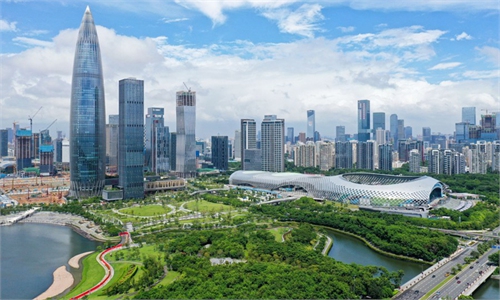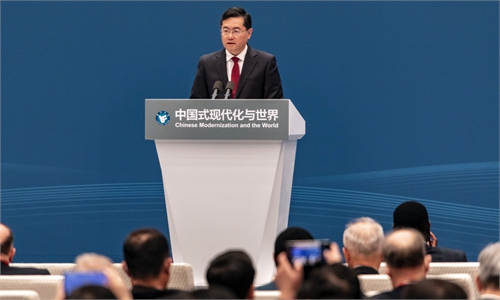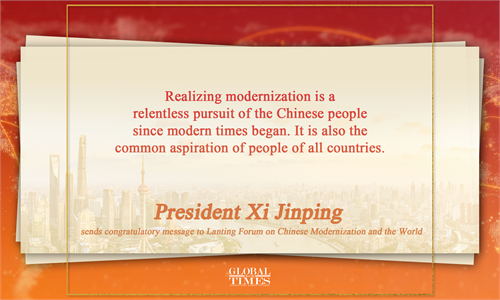China shares modernization experiences, wisdom at Lanting forum, hailed as the 'catalyst' for the modernization of the developing world
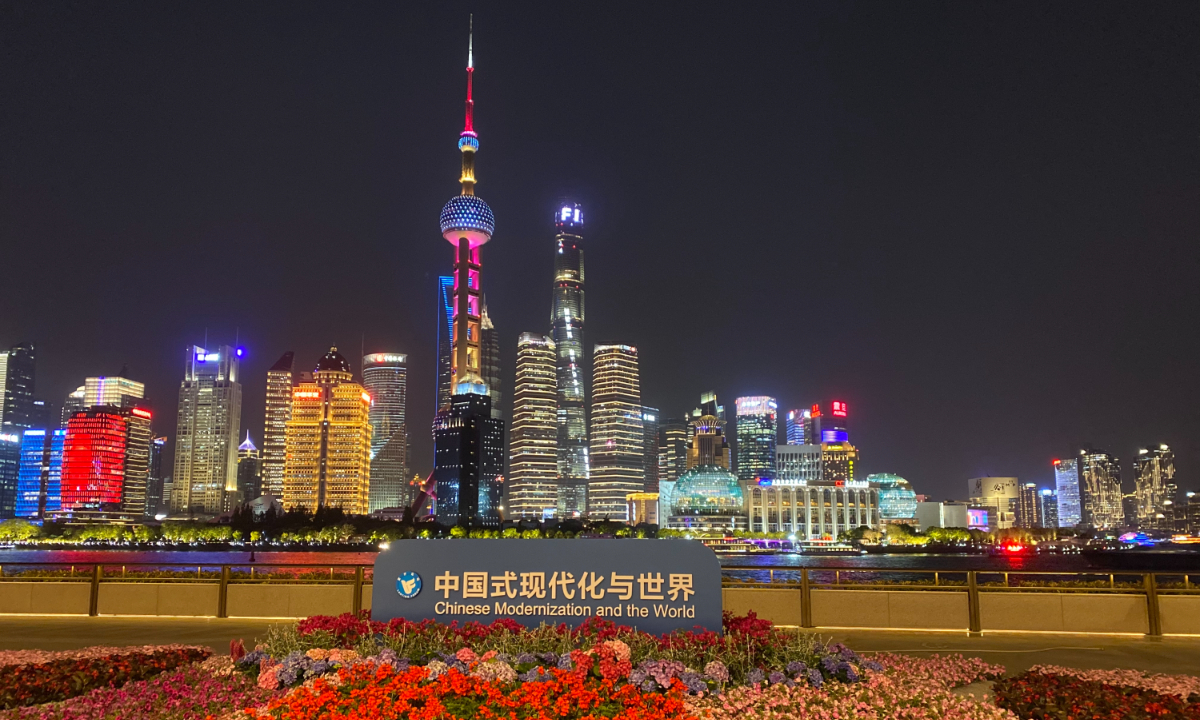
Photo: Yu Xi/GT
As the Lanting Forum on Chinese Modernization and the World kicked off in Shanghai on Friday, China has once again shown the world with its own successful practice of exploring Chinese modernization that there is more than one path to modernization, and every country has the right to embark on a modernization road that suits its own national conditions based on its own reality. This will help break the monopoly position of the West in modernization practice and theory, broaden the vision of developing countries and enhance their determination and confidence in taking the road of independent development, analysts said.
Chinese President Xi Jinping sent a congratulatory message to the forum, attended by representatives of governments, think tanks and the media from nearly 80 countries.
"Realizing modernization is a relentless pursuit of the Chinese people since modern times began. It is also the common aspiration of people of all countries. In pursuing modernization, a country needs to follow certain general patterns. More importantly, it should proceed from its own realities and develop its own features," Xi said.
As China is now building a strong country and advancing national rejuvenation on all fronts through a Chinese path to modernization, the country will provide new opportunities for global development with new accomplishments in Chinese modernization, lend new impetus to humanity's search for paths toward modernization and better social systems, and work with all countries to advance the building of a community with a shared future for mankind, Xi noted.
The modernization of China with such a huge population will be a stronger boost for global economic recovery, Chinese State Councilor and Foreign Minister Qin Gang said when delivering a keynote speech at the opening ceremony of the forum. With over 1.4 billion people on course toward modernization, a number larger than the combined population of all developed countries, China will give a much stronger impetus for the global economy, he noted.
China will defend the right to development of all countries with greater determination, Qin stressed. He pointed out that modernization is an inalienable right of every country, not a privilege reserved for a few. Those who have realized modernization should not tear down the bridge or block other countries' path to modernization and they should not suppress, contain or stop other countries that choose a different path to modernization.
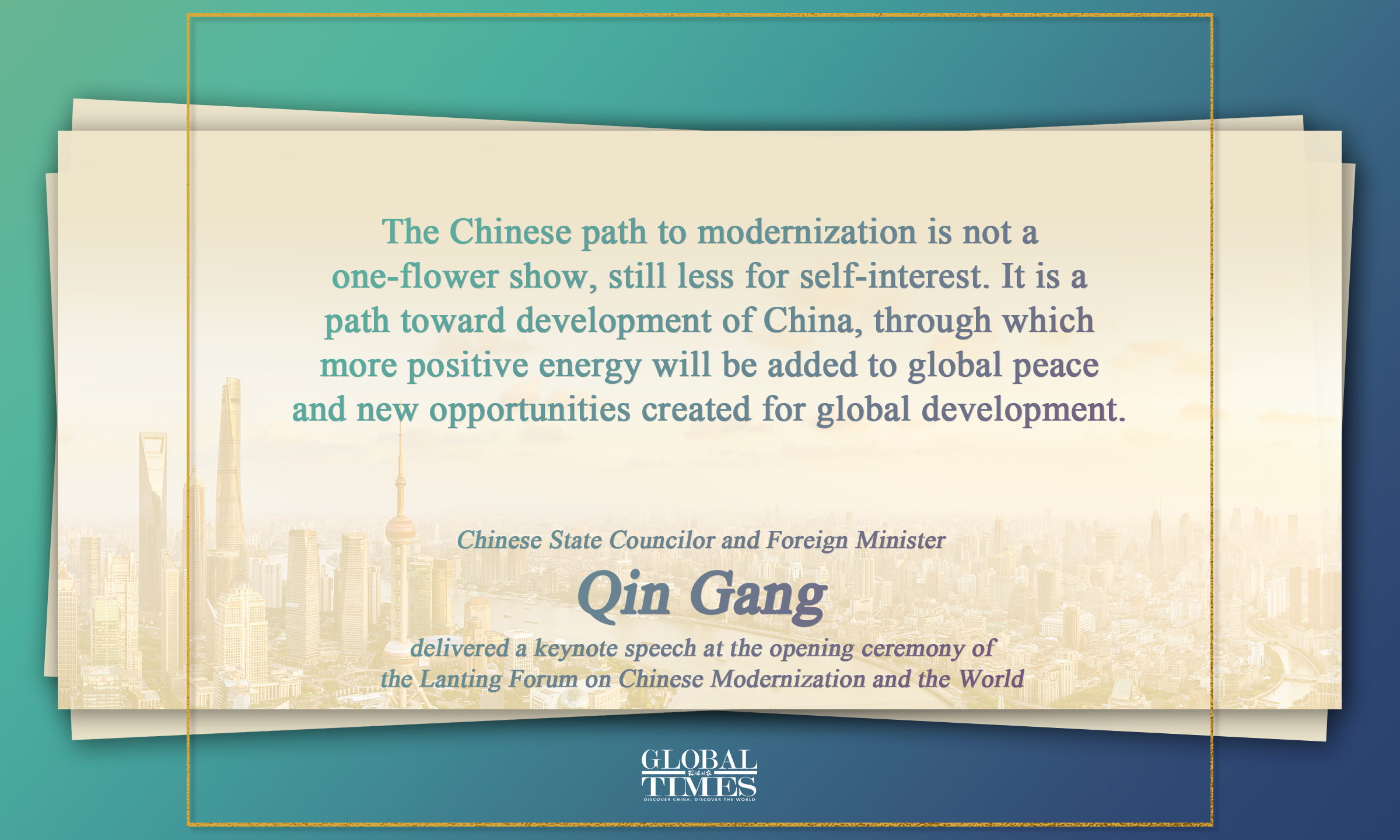
Highlights of State Councilor and Foreign Minister Qin Gang’s keynote speech at Lanting Forum. Graphic:GT
The myth of "modernization equals Westernization"
Foreign representatives spoke highly of China's peaceful and inclusive path of modernization. Observers pointed out that for a long time some Western countries have monopolized the right to speak about modernization, holding the Western-centered theory and constantly amplifying the illusion that "Westernization equals modernization." This forum, focusing on the significance of China's path to modernization to the world, has provided the other countries, especially the vast number of developing countries, with inspirations over how to explore their own paths of modernization.
China has inspired many developing countries to seek their own formula to reduce poverty and to promote their respective economic development and prosperity, Hon. Dr. Mamadou Tangara, Minister of Foreign Affairs of Republic of The Gambia, said in his speech at the opening ceremony. He called China's modernization "a miracle in the history of human development" that promoted poverty alleviation, common prosperity, ecological conservation and people-centered democracy as well as the rule of law.
A prosperous China is a welcomed development for many of African countries. History has demonstrated that China has a greater preoccupation with respecting civilizational differences of others and in Africa, there is no recollection of history that China has forcibly imposed its cultural ethos and abrogated the value and political systems of countries on the continent, Tangara said.
If the Chinese modernization process is well understood and well taken with good attention, it can help the world to achieve better modernization and achieve the community with a shared future, former Egyptian Prime Minister Essam Sharaf told the Global Times at the forum.
There are two poles in the international understanding of Chinese modernization, Huang Renwei, deputy director of the Fudan Institute for Belt and Road and Global Governance who is also attending the forum, told media, noting that thus it is necessary to explain the true meaning of Chinese modernization to the world.
On one hand, the US and other Western countries tend to interpret Chinese modernization from a negative perspective, believing that China's modernization path is wrong; on the other, more and more developing countries believe that China's experience can be used for reference, Huang noted. He said that what China is doing now is to turn its own development into opportunity for the world's development.
Zhu Min, vice chairman of the China Center for International Economic Exchanges and former Deputy Managing Director of the International Monetary Fund, told media at the forum that the world now is gradually reaching a consensus that there are different paths toward and contents of modernization. The West moves toward modernization via industrialization but nowadays modernization has to be conducted in accordance to the countries' specific conditions, current technology and the development trend in the future, Zhu said.
The Chinese modernization's relationship with the world is very different from Western modernization's relationship with the world, Martin Jacques, who was until recently a Senior Fellow at the Department of Politics and International Studies at Cambridge University, told the Global Times on Friday.
Taking Britain's industrial revolution, which was the first great act of modernization in the world, as an example, it built a colonial empire counting for one quarter of the world's population at its peak. Whereas the results of Western modernization, if you look at the world in 1900, was to divide the world into two, essentially: a very prosperous, relatively speaking, Western world and a very poor, mainly colonized world, he said.
Now China's modernization has been completely different, Jacques noted. Chinese modernization has taken place in close proximity, in an interaction with the developing world of which to China is a partner. And it's seen itself not as having an instrumentalist relationship with the developing world, but on the contrary, a relationship of cooperation and partnership, symbolized by the Belt and Road initiative, he said.
China has been the catalyst for the modernization of the developing world. And this just didn't happen with Western modernization, because it was based on the suppression and subjugation of the rest of the world, Jacques stressed.
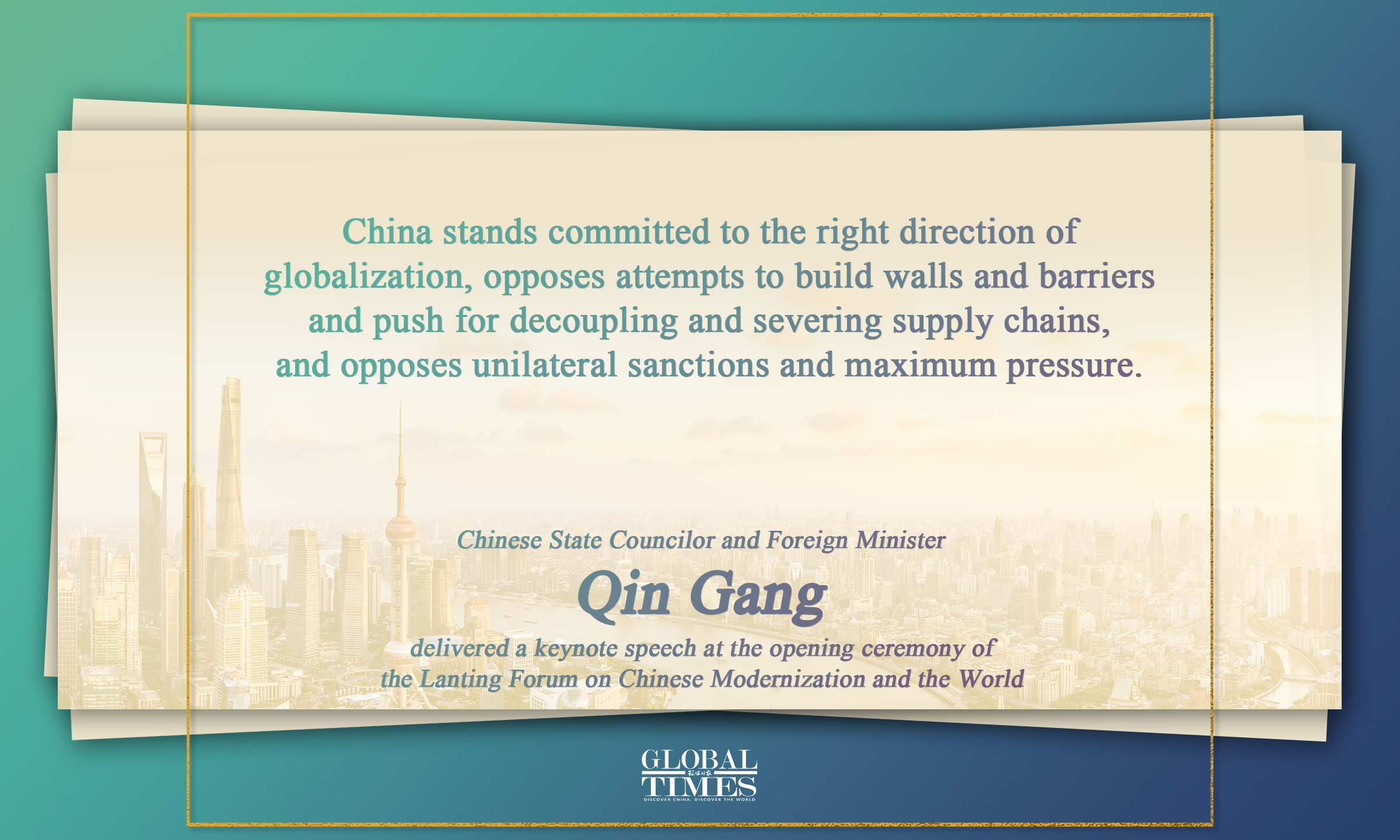
Highlights of State Councilor and Foreign Minister Qin Gang’s keynote speech at Lanting Forum. Graphic:GT
A boost to the force for peace and justice
The forum came amid a busy period for Chinese diplomacy and greater international expectations for China to play a bigger role in boosting global economy and fostering world peace, especially given China's efforts and achievements in promoting a reconciliation between Saudi Arabia and Iran that were previously hostile to each other.
The Global Security Initiative (GSI) put forward by President Xi has pointed out the right direction of pursuing common and universal security, Qin noted. In the face of the protracted Ukraine crisis, China does not inflame or take advantage of the situation. Rather, China has taken an impartial stance and pushed for peace talks in order to reduce the pressure and lower the temperature around the crisis. Facts have proved that a China moving toward modernization is a boost to the force for peace and justice, he noted.
The GSI and China's role in promoting global peace are also applauded at the Friday forum. "The GSI is widely considered timely in a progressively insecure world as it provides safeguards for regional and international security, peace, and stability. In this initiative, many countries will find a neutral partner in conflict resolution; the promotion of peace over conflict; and the establishment of global harmony in a multipolar world," said Tangara.
China is providing and contributing what most members of the international community desperately need at a time of global turbulence, and China is also boosting connections with the world by continuing to sincerely promote its reform and opening-up, actively improve international environment that benefits both Chinese modernization and the world's need for peace and recovery, said experts. This is why China is becoming increasingly popular at present, despite containment and stigmatization campaign from the US, they noted.
China's development advances are in accordance with the trend of our times, and is welcomed by the majority of the world, and what the US has done in past decades and the world order dominated by its hegemony has brought enough pain to the world, and doesn't go along with the trend of the times, Li Haidong, a professor at the Institute of International Relations at the China Foreign Affairs University, told the Global Times.
China stands committed to the right direction of globalization, opposes attempts to build walls and barriers and push for decoupling and severing supply chains, and opposes unilateral sanctions and maximum pressure, Qin said. He noted that China is doing its utmost to ensure stable and smooth functioning of industrial and supply chains, so that economic globalization and the modernization of all countries could move forward in tandem and complement each other.
When the world faces turbulence, it's very reasonable for the majority of the international community to expect a major power to play the role of stabilizer and mainstay, and now, "they see that hope from China, Li noted.
Qin also slammed some recent absurd rhetoric accusing China of challenging the so-called rules-based international order, of unilaterally changing the status quo across the Taiwan Straits through force or coercion, and of disrupting peace and stability across the Straits.
The Friday forum in Shanghai was organized by the China Public Diplomacy Association and the Chinese People's Institute of Foreign Affairs, and was supported by the Shanghai Municipal People's Government, according to a statement from the foreign ministry.
It is held at the Meet-the-World Lounge located alongside the Huangpu River in Shanghai and this is the first time that the Lanting Forum has been held outside Beijing.
